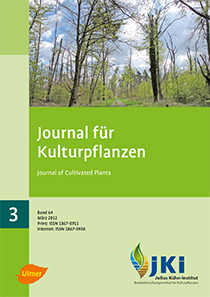Forest health and forest protection 2011 in the Federal Republic of Germany
DOI:
https://doi.org/10.5073/JfK.2012.03.01Keywords:
Forest health and forest protection 2011, insect pests, forest diseases, abiotic damageAbstract
The report gives an overview of the situation on forest health and forest protection during the year 2011 in the Federal Republic of Germany. The heavy snowfall at the beginning of this year led to large losses caused by snow fraction and snow pressure. Immediate the effective monitoring measures and harvesting of damaged wood limited outbreaks of spruce bark beetles (Ips typographus, Pityogenes chalcographus). The variable humid climate in summer defused this situation. Later in the year there were more extensive damages, because of late frost and torrential rain with flooding of entire forest stands. Overall, the situation of forest health in 2011 was tense and it revealed a disturbing trend in the forests pests. Against pine forest pests (Panolis flammea, Diprion spp.) and nun moth (Lymantria monacha) as well as oak feeding society (Tortrix viridana, Erannis defoliaria, Operophtera brumata, Orthosia spp.) some aerial treatments were necessary. Furthermore the outbreak of oak processionary moth (Thaumetopoea processionea) continues and regional treatments were performed. The vitality of oak trees and oak stands is also continuing concern. In the interest of forest protection, prevention measures are necessary, which can only be realised via the regulation of leaf-eating insect pests in order to avoid further loss. Favorable weather conditions during the vegetation period resulted in tree diseases on douglas-fir (Phaeocryptopus gaeumannii) and pine (Lophodermium seditiosum). The new ash decline remains at a high level and the East Asian pest of elms (Aproceros leucopoda) has arrived in Germany.
Downloads
Published
Issue
Section
License
The content of the journal is licensed under the Creative Commons Attribution 4.0 License. Any user is free to share and adapt (remix, transform, build upon) the content as long as the original publication is attributed (authors, title, year, journal, issue, pages).
The copyright of the published work remains with the authors. The authors grant the Journal of Cultivated Plants, the Julius Kühn-Institut and the OpenAgrar repository the non-exclusive right to distribute and exploit the work.







